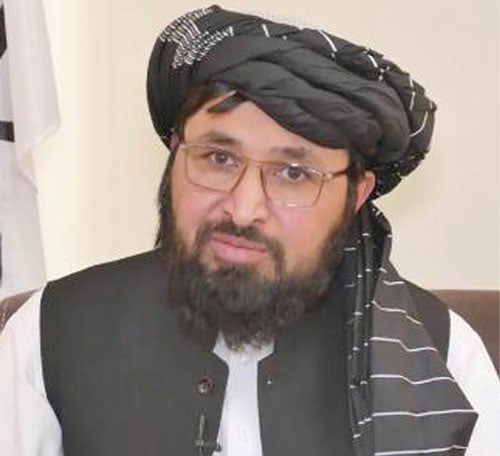A 10-member delegation of the Islamic Emirate traveled to Geneva, Switzerland to discuss the status of humanitarian assistance to Afghanistan, officials said.
The visit happened following an invitation from Geneva Call, according to an Islamic Emirate spokesman.
Geneva Call said in a press release that the organization is hosting a restricted-access conference between Feb. 7-11, which aims to enhance “unimpeded” delivery of humanitarian assistance to Afghanistan.
“Geneva Call has therefore invited the Islamic Emirate of Afghanistan (IEA) to a restricted-access conference to discuss the status of humanitarian assistance, the protection of civilians, respect of health care and the issue of landmines and explosive remnants of war in Afghanistan,” the press release read. “The conference includes briefings on the applicability of humanitarian norms and thematic group discussions to provide concrete recommendations on how the delivery of humanitarian assistance can lead to better collaboration in country and to the provision of better support to the Afghan people from external contributors.”
A spokesman for the Islamic Emirate said the Afghan delegation is comprised of officials from the Ministries of Defense, Health, and Interior Affairs.
“They will participate in a joint conference. They will discuss the issues related to humanitarian aid, humanitarian norms and humanitarian contracts and how aid will be provided,” said Bilal Karimi, deputy spokesman for the Islamic Emirate.
As Afghanistan is facing an unprecedented humanitarian crisis, many world countries and international organizations are seeking to find ways of providing support to the people as the recognition of the Islamic Emirate still remains an unsolved problem.
“It means that the international aid will be provided in an easy way to the people,” said Toreq Farhadi, an international relations analyst.
The delegation of the Islamic Emirate is expected to meet with the country’s officials as well as foreign envoys and representatives of aid organizations.
“These negotiations are constructive because the future of Afghanistan is important and there should (discussion) on how to form governance,” said Zakir Sadat, a political analyst.
Afghanistan’s Third Way, a political movement, claimed that the Islamic Emirate’s delegation would hold talks with its members on February 11 and 12 in Switzerland.
The Norwegian Ministry of Foreign Affairs says hosting the three-day talks between the Islamic Emirate, Afghan political leaders and Afghans representing media, women, and civil society, and envoys and officials of Western countries, does not indicate a “legitimization” of the Islamic Emirate.
The ministry in a statement said it is important that the Afghans sat together and talked face-to-face about their views on the humanitarian situation, human rights and the future of their country.
“Let me stress that facilitating talks such as these in no way represents a legitimization of the de facto authorities in Afghanistan. Nor does it represent any change in Norwegian policy. We know the Taliban will actively defend their own interests – and are seeking legitimacy. That is one of the reasons that I, as Minister of Foreign Affairs, did not meet with them. We have issued clear demands, and now we must wait and see if they deliver on what they have said,” Minister of Foreign affairs Anniken Huitfeldt said.
Huitfeldt said legitimization must come from the people of Afghanistan, emphasizing the Islamic Emirate should form an inclusive government to ensure stability in the country. “For the first time since taking power, the Taliban agreed to have a in-depth political discussion with women activists and other opinion leaders in Afghan society. Face to face, in a safe place, they were given a clear message: legitimacy must come from the Afghans themselves, and it requires reconciliation and a more inclusive form of government,” she said.
According to Norway’s foreign minister, the meetings provide a basis for further contact between Afghans to seek ways towards reconciliation. It also was an opportunity to talk about Afghanistan’s dire humanitarian needs. “The meetings here in Oslo provided a good opportunity for Western countries such as Norway, France, the UK, Italy, Germany and the United States as well as the EU to make clear what they expect of the Taliban. —Agencies










